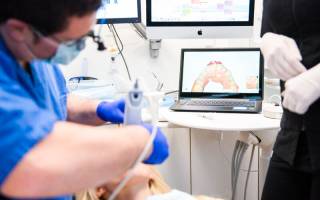Professor Stefano Fedele with UCL’s Department of Electronic and Electrical Engineering.
Mouth cancer is the sixth most common cancer in the world, but it's much less common in the UK. Around 6,800 people are diagnosed with mouth cancer each year in the UK. Often this is at an advanced stage, when the disease has spread and curative treatment becomes difficult and complex. |
|---|
Early diagnosis of oral cancer is an unmet need. Previous attempts to develop diagnostic aids for oral cancer have failed to obtain an effective instrument that could be used in primary care (by GPs and dentists) to identify, with robust sensitivity and specificity, oral mucosal changes that are likely to represent oral cancer.
The impact that an effective and easy-to-use non-invasive diagnostic device might have on oral cancer prognosis and the NHS is potentially enormous. The World Health Organisation has strongly indicated that early diagnosis of oral cancer is key in reducing its mortality and
Activities
The study builds upon our previous clinical research in the field of early non-invasive diagnosis of oral cancer.
The aim is to develop and clinically test a novel non-invasive diagnostic medical device, which can provide instantaneous information about the tissue morphology and structure, in order to distinguish between cancer and normal tissue.
We are currently developing the technology in the laboratory before testing in a proof-of-concept clinical trial.
Potential Impact
The impact that an effective and easy-to-use non-invasive diagnostic device might have on oral cancer prognosis and the NHS is potentially enormous. The World Health Organisation has strongly indicated that early diagnosis of oral cancer is key in reducing its mortality and morbidity. Five-year mortality is suggested to drop from 80% to 20% when oral cancer is diagnosed and treated an early stage.
The NHS costs of oral cancer treatment have also been suggested to decrease notably for early stage disease. Most importantly, survivors would not have to experience the morbid mutilation of oral and facial tissues or the permanent adverse effects of radiotherapy that currently most patients with advanced oral cancer develop.
 Close
Close




